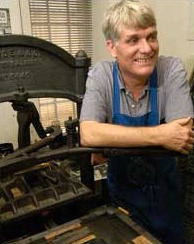H-50. The American Book in the Industrial Era, 1820–1940
Michael Winship
This course will introduce students to the manufacturing methods, publishing practices, distribution networks, and use of books, periodicals, and other printed materials in the United States during the industrial era, roughly from the 1820s to the 1940s. Particular attention will be paid to exploring the introduction and impact of the new industrial production technologies that defined the period, but other topics to be addressed include: the development of trade publishing and other publishing systems; methods of book distribution, including the role of bookstores, as the book market expanded across the continent; authorship, copyright, and the importance of the international trade in American and British books and texts both before and after the 1891 Chace Act; and reading and the multiple ways that readers acquired and used books.
The course is aimed at scholars, librarians, collectors, and others whose work or research requires in-depth knowledge of the American industrial book and, thus, is intended for those who already have some familiarity with book production methods and American book history. Although it serves as a chronological sequel to James N. Green’s “History of the Book in America, c. 1700-1830” (H-70) and his and my “History of the Book in Antebellum America” (H-135), the approach here is more bibliographical, in the broadest sense, than book historical.
The Rare Book School teaching collection is especially rich in printed materials from this period, and students will have an opportunity to study multiple examples that illustrate important features of the American industrial book; digital copies of some manuscript material will also be discussed to illustrate the business practices of book manufacturers and publishers. Students will be introduced to important reference works and other resources for the study of American book history and are encouraged to share their own research projects with the instructor and class members. In their personal statement, applicants are requested to summarize briefly their background in the field, current research projects, if any, and topics or issues that they would particularly wish the course to address.
Course History
Faculty

Michael Winship
Michael Winship is Iris Howard Regents Professor of English II (emeritus) at the University of Texas at Austin and edited the final three volumes of the nine-volume Bibliography of American Literature. He is the author of American Literary Publishing in the Mid-Nineteenth Century: The Business of Ticknor and Fields (1995) and has published widely on the nineteenth-century American book and publishing trades. He was an editor of and contributor to The Industrial Book, 1840–1880 and contributor to Print in Motion: The Expansion of Publishing and Reading in the United States, 1880–1940 (volumes 3 and 4 of A History of the Book in America), and served on that series’ editorial board. He has taught annually at RBS since 1983.
Courses Formerly Offered
- Descriptive Bibliography, 1820–1914 (1989–1993)
- History of the American Book (1987–1988, with Edwin Wolf 2d)
- Bibliography of 19th-Century American Books (1986)
- Publishers’ Bindings, 1780–1910 (1984–1985, with Sue Allen)
- The 19th-Century Book (1983); The 19th-Century English & American Book (1984); Sources for the Study of the 19th-Century English & American Book (1985) | co-taught with Michael Turner
